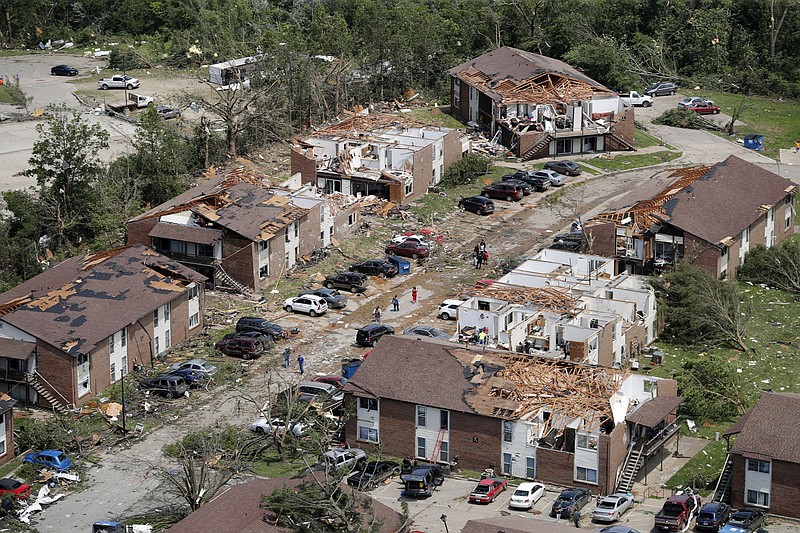A group of organizations has gathered to offer community discussions intended to give people the tools they need to cope with trauma associated with recent Mid-Missouri disasters.
SSM Health Care's Outpatient Behavioral Health, Capital Region Physicians Center for Mental Wellness, Catholic Charities of Central and Northern Missouri, the Anne Marie Project, Compass Health Network, Community Health Center of Central Missouri and the United Way of Central Missouri are to host "Coping with Disaster."
The program, given by Josh Varner, a social/emotional counselor and coach, is intended to help people come to terms with trauma and post traumatic stress, and to promote their mental wellness after flooding and the May 22 tornado that struck Central Missouri.
It will be offered 5:30-7 p.m. July 18 at the Jefferson City Area YMCA, Knowles Center Annex Building, 424 Stadium Blvd.; and 5:30-7 p.m., July 19, at Eldon High School, 101 S. Pine St.
Free child care will be provided.
"When this happened, a couple of people reached out to me," Varner said. "A lot of these different agencies were talking about doing their own things. I said, 'Let's roll this into one event.'"
After almost two months, organizers said, disaster victims should hopefully be getting most of their physical needs met.
"And, we thought it was time to begin to meet their mental health or emotional needs," Varner said. "We recognize there is a big need."
For the most part, people the tornado displaced have found housing, said Laurel Kramer, a psychologist at the St. Mary's Hospital outpatient behavioral health clinic. It's four to five weeks after the storm, and the shock has worn off.
People are still dealing with the daily phone calls and communications, trying to get their lives back in order. Before you know it, she said, the added stress of preparing children to go back to school will also be on parents' shoulders.
"Now is when the long haul is going to set in," Kramer said. "People realize all these things they've lost. At this point in time, we're seeing more depression and anxiety."
Families are simply trying to regroup, she said.
"The help that was in their faces is not as easy to access now," Kramer said. "People are getting back to 'normal' living and realizing that this is going to be months."
For the most part, the tornado affected the poorest communities in Jefferson City, said Julie Gramlich, youth minister for Cathedral of St. Joseph Parish and founder of the Anne Marie Project, which is intended to help young people face their challenges.
"I know a young girl whose house (the tornado) went over," Gramlich said. "She went to the basement with her dad. Now, she's struggling with loud noises and anxiety."
Other people have said they never heard anything like the sound the twister made that late night, Gramlich added.
"Our young people, for the most part, are dealing with displacement - or with a sense of displacement," she said.
Others, including adults, are dealing with depression.
They are probably isolating themselves, although they shouldn't be, she said.
"They don't want to talk about (the tornado)," Gramlich said. "They want to forget. They need to be able to talk about it - without necessarily reliving it."
If someone talks about what's bothering them in the correct environment, they can gain a sense of letting go of the issue, Gramlich said.
Organizers hope to give folks a sense of how to talk about the disasters.
The seminars are open to the public, and meals will be served.
Organizers anticipate people from a wide range of backgrounds are going to attend. If they don't need the service directly, attendees should be able to take home knowledge to share with somebody else they may know who underwent trauma.
St. Mary's Foundation Director Bev Stafford said the group hopes to help people eliminate "long-term stress."
The July discussions will be given in three-part presentations, Varner said.
Each discussion will begin with a look at what trauma is and how to prevent it. From there, Varner will discuss how people's bodies respond to trauma and what it does to their behavior. Finally, he and organizations at the event will provide tools to attendees, so they may be able to help somebody else or at least point them to resources that are available.
Additionally, organizers are trying to put together a child-appropriate program that would take place at the same time. That program has not been confirmed yet.
A child program has been conducted in Jefferson City in the past. During the Flood of 1993, Varner said, organizers offered a presentation with puppets. It looked at what they went through, how they felt and what they were doing following the floods.
"It would be so a 4-year-old or 5-year-old can process what happened," Varner continued. "I would love it if they had their own event."
A goal for the July events is to get victims and their family members involved in emotional health recovery.
The group is already planning for follow-up meetings - to occur periodically - and hopes to have an event a year after the disasters.

